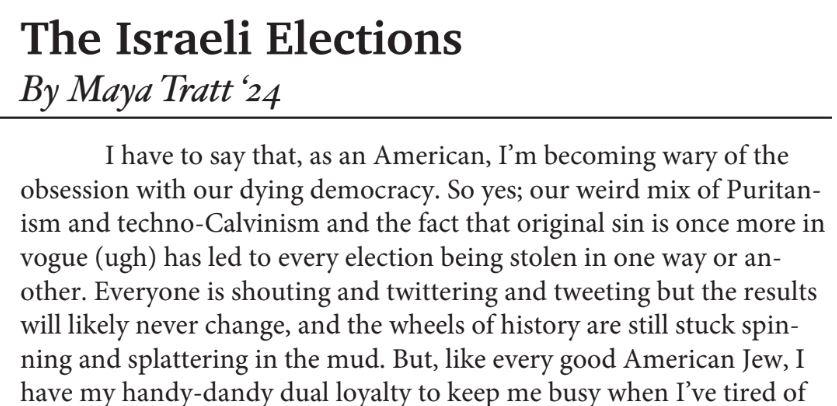I have to say that, as an American, I’m becoming wary of the obsession with our dying democracy. So yes; our weird mix of Puritanism and techno-Calvinism and the fact that original sin is once more in vogue (ugh) has led to every election being stolen in one way or another. Everyone is shouting and twittering and tweeting but the results will likely never change, and the wheels of history are still stuck spinning and splattering in the mud. But, like every good American Jew, I have my handy-dandy dual loyalty to keep me busy when I’ve tired of America. Election junkies look no further than our historical homeland of Israelwith its fifth election in just under four years, to satiate all your political needs.
Being a parliamentary democracy, Israel’s political parties need 3.25% of the popular vote to gain a number of seats in the Knesset. Once this happens, a sort of Big Brother-type game ensues (seriously, someone should make this into a reality show; I’d watch it) where the parties need to make alliances to form a majority of 61 seats in the Knesset. This system is obviously very volatile, with offending the wrong person deciding the difference between a coalition and more elections.
Last election (around 1.25 years ago), Yair Lapid and Naftali Bennet managed to scramble together a coalition of vastly disparate viewpoints, mostly assembled against Binyamin Netanyahu, but it quickly collapsed. Hence the new elections! I really think it’s only fitting that the one Jewish State on Earth is so obsessed with disagreements that they’ve had five elections before we’ve even had one but, anyway, I digress…
Netanyahu heads up the center-right party in Israel, Likud, and they’re projected to do very well this election, winning almost a quarter of the seats in the Knesset. The popular vote usually does go for Likud, but Netanyahu is becoming more and more polarizing and frustrating to Israelis as he seems to only care about forwarding his own political agenda and power. Current Prime Minister Lapid heads up the Yesh Atid party and is hoping for a strong second place; he’s been surprisingly strong on Israeli self-defense but Yesh Atid is less religious than Likud, more Ashkenazi, and more left generally. Benny Gantz, the defense minister, is heading up a new party (“National Unity’’– c’mon guys, how could you not support that?) cut from the same cloth as Yesh Atid. But the really interesting—and harrowing, depending on where you are politically—difference in this election is the stratospheric rise of Itamar Ben Gvir and his far-right party “The Religious Zionist Party.” Netanyahu offered him a powerless seat in the coalition in the last election, needing the votes, but, formerly blackballed by the Israeli establishment, Ben Gvir has managed to make a name for himself.
Ben Gvir was declared too radical to serve in the Israeli army at the age of 17 and has expressed support and admiration for both Baruch Goldstein (responsible for the Hebron massacre) and Rabbi Meir Kahane (whose political party was banned from the Knesset for inciting violence). Ben Gvir manages to repackage it in a form that’s been peculiarly resonant with many Israelis. Promising that he’s moderated, Ben Gvir advocates for a Jewish state in areas now claimed by the Palestinian Authority, wants terrorists (and also possibly leftists? He’s been unclear on this…) to be deported after conviction, and a strong sense of Jewish nationalism (emphasized by his slogan “who are the masters of the house?”). He’s garnered more airtime than any other candidate and, coupled with the rising spate of Palestinian violence, the ever-present threat of Hezbollah in the North, and the failure of Israeli capitulations to the PA, Ben Gvir’s charisma makes him a sympathetic figure to a lot of Israelis and puts his party in a place to become the third largest party in the Knesset.
Phew, even I’m tired now, and we don’t have to focus on the dismal and gray state of American politics. But it seems to be that more authoritarian and strong-men-like figures are quickly gaining traction around the globe, Israel not excluded. Jewish political power is truly a new—and wonderful, don’t get me wrong— phenomenon, and I just pray we don’t screw it up too badly.
This story received First Place in the 2023 Jewish Scholastic Journalism Awards for “News and feature reporting on current events involving Israel.” Judges said “An informative piece on Israeli politics written with just the right bit of humor.”












